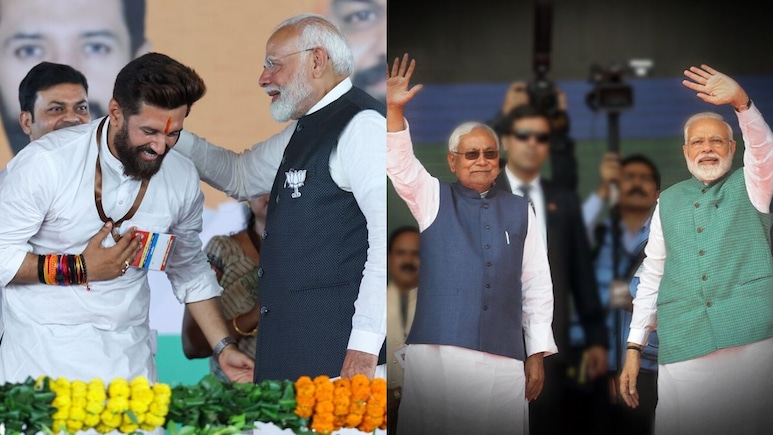
- NDA in Bihar finalised seat-sharing, with the BJP and JDU getting 101 seats each
- A meeting with Union minister Amit Shah resolved alliance deadlock, per sources
- The alliance strategy focuses on caste and region, apart from flexibility and unity among allies, sources said
The National Democratic Alliance (NDA) has ironed out its seat-sharing differences in Bihar ahead of the upcoming Assembly polls after days of back-and-forth between its constituents.
BJP and JD(U) will fight in 101 constituencies each, while Chirag Paswan-led LJP(R) will fight from 29 seats. Jitan Ram Majhi's HAM has been given six seats, one less than seven it fought in 2020, while Upendra Kushwaha's RLM has been given six seats.
Sources within the alliance said the deadlock was broken after a late-night meeting of NDA partners with Union Home Minister Amit Shah, during which all key players were present and urged to display flexibility in the larger interest of unity.
According to senior leaders, the meeting, which capped a series of marathon discussions held over the past few days, focused on ensuring a "respectable and balanced" seat arrangement for every constituent. The BJP, they said, was keen to close the negotiations early to gain a psychological and organisational advantage in the run-up to the elections.
"All partners have been heard, and everyone's concerns were addressed. The message was clear - adjust wherever needed, and stay united," a senior NDA functionary said.
Sources added that the seat-sharing formula closely mirrors the one followed in the last Assembly polls. Then, the BJP had contested 110 seats and the Janata Dal (United) 115, while the Hindustani Awam Morcha (HAM) and the Vikassheel Insaan Party (VIP) were adjusted from their respective quotas, creating a small disparity of around five seats between the two main partners.
"It was equal distribution even then, but since the smaller parties were given seats from the shares of BJP and JDU, the difference of five seats came up," a source said.
This time, NDA sources indicated that the formula would largely remain intact, with minor adjustments made to accommodate the interests of smaller allies. "The emphasis was on ensuring that no partner felt sidelined or short-changed," an insider said. BJP also had to explain to other allies about the call to give in to Chirag Paswan's demands, who emerged as a tough negotiator with 29 seats.
The alliance has also factored in the electoral weight of key social blocs. In the previous election, 29 seats were given to Chirag Paswan's party to consolidate the nearly six percent Paswan vote across Bihar - a factor that remains central to the NDA's caste arithmetic. Sources said similar caste and regional considerations continue to shape the alliance's strategy this time, with an effort to balance representation across communities and regions.
Rejecting opposition claims of any friction within the NDA, BJP sources said there was "no question of disrespecting" the JD(U). "Chief Minister Nitish Kumar remains central to the alliance. He is the face of governance and stability. Alongside him, Chirag Paswan, Jitan Ram Manjhi, and Upendra Kushwaha act as force multipliers who bring in crucial community support," a BJP leader said. He added that EBCs, Mahadalits and women form the biggest block of NDA voters and Nitish Kumar was central to them supporting the NDA.
The source added that in the past, several of these allies had contested on their own or with the opposition, but failed to make a significant impact. "The message from the leadership was clear - only unity can deliver results. The NDA brand of collective campaigning and cross-party coordination has to be the template going forward," the leader said.
The BJP leadership is also said to have emphasised the importance of moving past recent public spats and focusing on joint rallies and constituency-level coordination. The strategy now shifts to a joint campaign plan that will highlight the development record of both the state and the Centre, positioning the alliance as the only stable and credible alternative for Bihar's voters.
NDA sources said the talks with Shah were decisive, bringing all the leaders on board after weeks of uncertainty. "Each partner left the meeting reassured about their role and relevance within the coalition," one of them said. "The central message from Amit Shah was that internal differences must not become headlines - the focus should be on delivery, coordination and preparation."
The BJP also reminded allies that even in the 2024 Lok Sabha polls, the party had contested just one seat more than the JD(U), underscoring the balance between the two primary partners. The near parity, leaders said, reflected mutual respect and shared responsibility within the coalition.
Track Latest News Live on NDTV.com and get news updates from India and around the world

